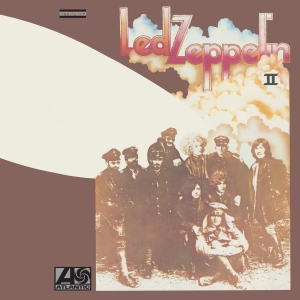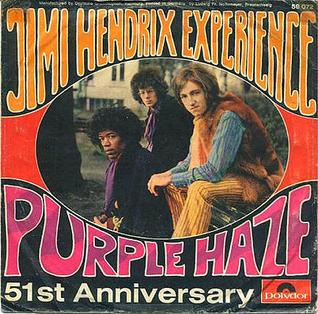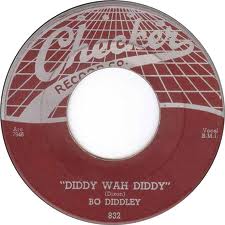
James Marshall "Jimi" Hendrix was an American musician, singer, and songwriter. Although his mainstream career spanned only four years, he is widely regarded as one of the most influential electric guitarists in the history of popular music, and one of the most celebrated musicians of the 20th century. The Rock and Roll Hall of Fame describes him as "arguably the greatest instrumentalist in the history of rock music".

Led Zeppelin II is the second studio album by the English rock band Led Zeppelin, released on 22 October 1969 in the United States and on 31 October 1969 in the United Kingdom by Atlantic Records. Recording sessions for the album took place at several locations in both the United Kingdom and North America from January to August 1969. The album's production was credited to the band's lead guitarist and songwriter Jimmy Page, and it was also Led Zeppelin's first album on which Eddie Kramer served as engineer.

Electric Ladyland is the third and final studio album by the Jimi Hendrix Experience and the final studio album released in Hendrix's lifetime before his death in 1970. Released by Reprise Records in North America on October 16, 1968, and by Track Records in the UK nine days later, the double album was the only record from the band produced by Hendrix. By mid-November, it had charted at number one in the US, where it spent two weeks at the top spot. Electric Ladyland was the Experience's most commercially successful release and their only number one album. It peaked at number six in the UK, where it spent 12 weeks on the chart.

"Purple Haze" is a song written by Jimi Hendrix and released as the second single by the Jimi Hendrix Experience on March 17, 1967. The song features his inventive guitar playing, which uses the signature Hendrix chord and a mix of blues and Eastern modalities, shaped by novel sound processing techniques. Because of ambiguities in the lyrics, listeners often interpret the song as referring to a psychedelic experience, although Hendrix described it as a love song.

Are You Experienced is the debut studio album by the Jimi Hendrix Experience. Released in 1967, the LP was an immediate critical and commercial success, and it is widely regarded as one of the greatest debuts in the history of rock music. The album features Jimi Hendrix's innovative approach to songwriting and electric guitar playing which soon established a new direction in psychedelic and hard rock music.

A guitar solo is a melodic passage, instrumental section, or entire piece of music written for a classical guitar, electric guitar or an acoustic guitar. In 20th and 21st century traditional music and popular music such as blues, swing, jazz, jazz fusion, rock and metal, guitar solos often contain virtuoso techniques and varying degrees of improvisation. Guitar solos on classical guitar, which are typically written in musical notation, are also used in classical music forms such as chamber music and concertos.

Charles "Skip" Pitts was an American soul and blues guitarist. He is best known for his distinctive "wah-wah" style, prominently featured on Isaac Hayes' title track from the 1971 movie Shaft. He is widely considered to have been one of the architects of soul, R&B and funk guitar.
John Porter is an English musician and record producer.

Edwin H. Kramer is a South African-English recording producer and engineer. He has collaborated with several artists now in the Rock and Roll Hall of Fame, including the Beatles, David Bowie, Eric Clapton, Jimi Hendrix, the Kinks, Kiss, Led Zeppelin, the Rolling Stones, John Mellencamp, and Carlos Santana.
"Little Wing" is a song written by Jimi Hendrix and recorded by the Jimi Hendrix Experience in 1967. It is a slower tempo, rhythm and blues-inspired ballad featuring Hendrix's vocal and guitar with recording studio effects accompanied by bass, drums, and glockenspiel. Lyrically, it is one of several of his songs that reference an idealized feminine or guardian angel-like figure. At about two and a half minutes in length, it is one of his most concise and melodically focused pieces.

John Norum is a Norwegian-Swedish rock guitarist and one of the founders of the Swedish rock band Europe. Concurrent to his role with Europe, he also maintains a career as a solo artist.

Aynsley Thomas Dunbar is an English drummer. He has worked with John Mayall, Frank Zappa, Jeff Beck, Journey, Jefferson Starship, Nils Lofgren, Eric Burdon, Shuggie Otis, Ian Hunter, Lou Reed, David Bowie, Mick Ronson, Whitesnake, Pat Travers, Sammy Hagar, Michael Schenker, UFO, Michael Chapman, Jake E. Lee, Leslie West, Kathi McDonald, Keith Emerson, Mike Onesko, Herbie Mann and Flo & Eddie. Dunbar was inducted into the Rock and Roll Hall of Fame as a member of Journey in 2017.

Band of Gypsys is a live album by Jimi Hendrix and the first without his original group, the Jimi Hendrix Experience. It was recorded on January 1, 1970, at the Fillmore East in New York City with Billy Cox on bass and Buddy Miles on drums, frequently referred to as the Band of Gypsys. The album mixes funk and rhythm and blues elements with hard rock and jamming, an approach which later became the basis of funk rock. It contains previously unreleased songs and was the last full-length Hendrix album released before his death.

Thomas Wright Scott is an American saxophonist, composer, and arranger. He was a member of The Blues Brothers and led the jazz fusion group L.A. Express.
"Voodoo Chile" is a song written by Jimi Hendrix and recorded in 1968 for the third Jimi Hendrix Experience album Electric Ladyland. It is based on the Muddy Waters blues song "Rollin' Stone", but with original lyrics and music. At 15 minutes, it is Hendrix's longest studio recording and features additional musicians in what has been described as a studio jam.

"Voodoo Child " is a song recorded by the Jimi Hendrix Experience in 1968 that appears as the final track on the Electric Ladyland album released that year. It contains improvised guitar and a vocal from Jimi Hendrix, backed by Noel Redding on bass and Mitch Mitchell on drums. The song is one of Hendrix's best known; it was a feature of his concert performances throughout his career, and several live renditions were recorded and released on later albums.
The Cry of Love Tour was a 1970 concert tour by American rock guitarist and singer Jimi Hendrix. It began on April 25, 1970, at the Forum in Inglewood, California, and ended on September 6, 1970, at the Love & Peace Festival in Fehmarn, Germany. The majority of the 37 shows were in the United States, with two each in Sweden, Denmark, and Germany, and one in England, where Hendrix was the final act at the Isle of Wight Festival 1970.

"Diddy Wah Diddy" is a song written by Willie Dixon and Ellas McDaniel, known as Bo Diddley, and recorded by the latter in 1956. The song shares only its title with Blind Blake's song "Diddie Wah Diddie" recorded in 1929. Over the years, the Bo Diddley song has been covered by many bands and artists, including the Astronauts, Captain Beefheart and his Magic Band, the Remains, the Twilights, Taj Mahal, the Sonics, the Fabulous Thunderbirds, Ty Segall Band, and the Blues Band among others.

"Hear My Train A Comin'" is a blues-based song written by Jimi Hendrix. Lyrically, it was inspired by earlier American spirituals and blues songs which use a train metaphor to represent salvation. Hendrix recorded the song in live, studio, and impromptu settings several times between 1967 and 1970, but never completed it to his satisfaction.














